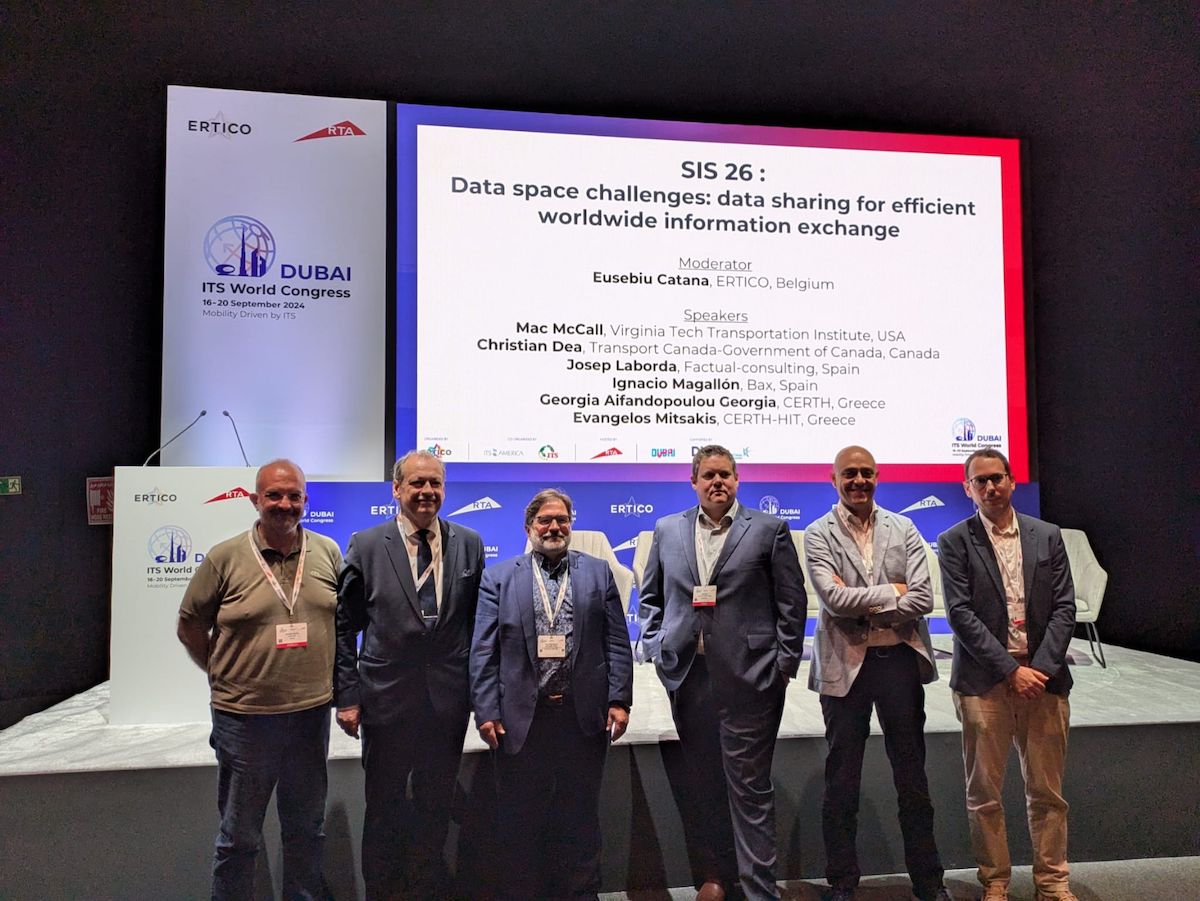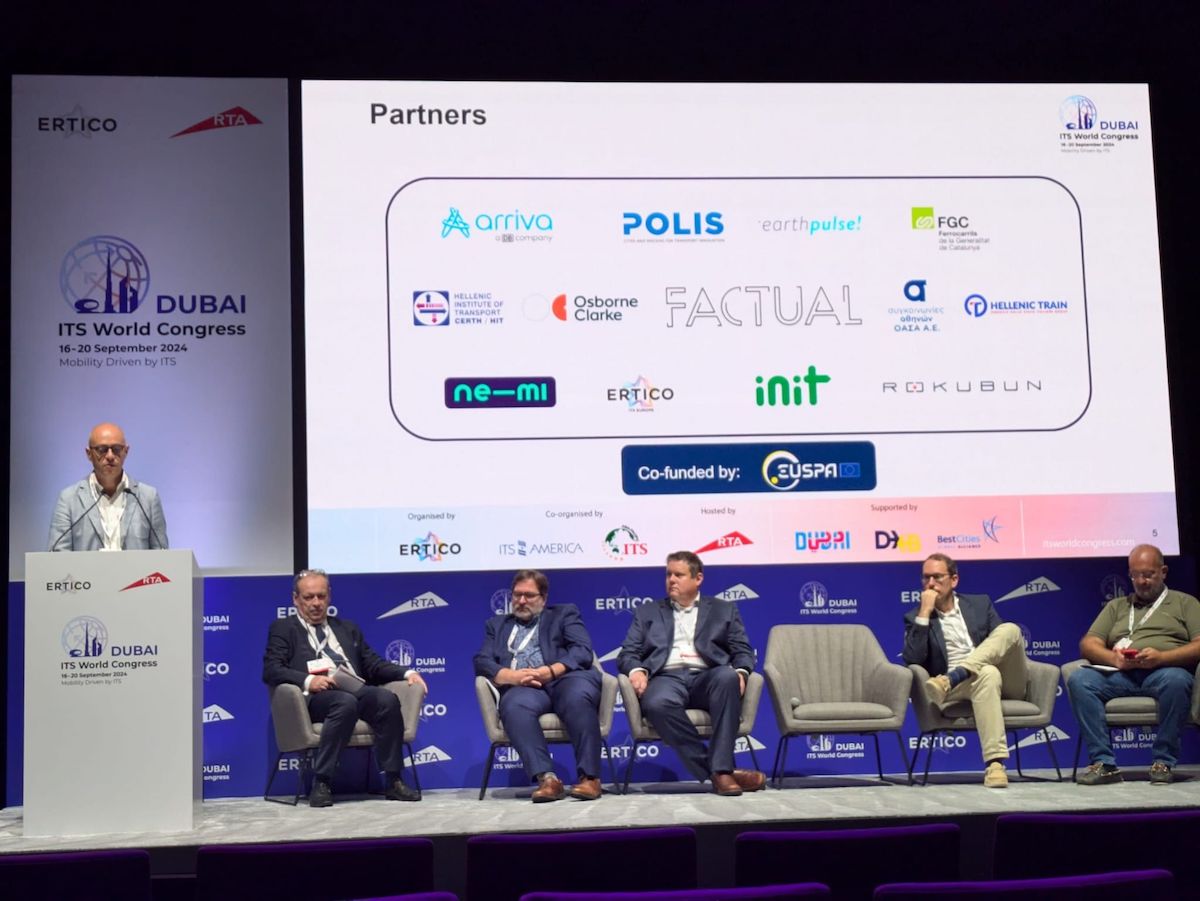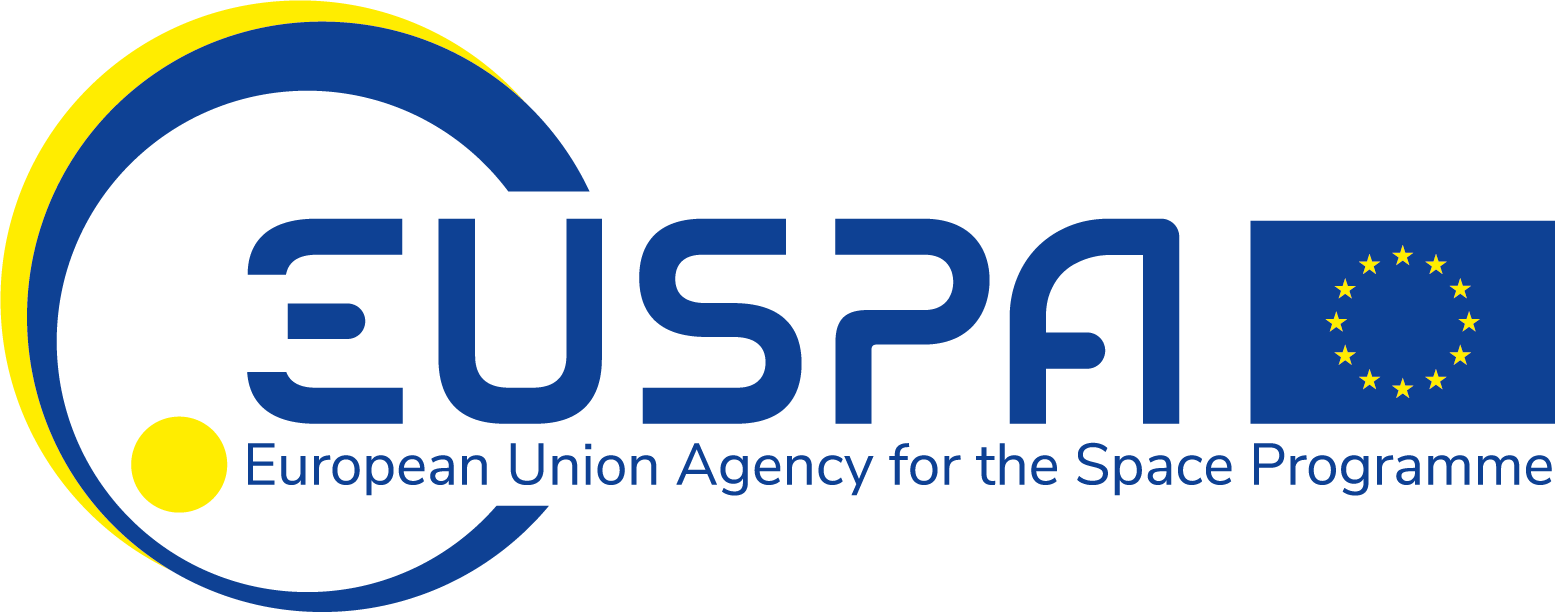JULIA at ITS World Congress: Discussing Galileo’s impact on global mobility
JULIA was present at the 30th ITS World Congress in Dubai from 16th to 20th of September 2024. This congress is organised by ERTICO every two years in Europe, and every third year in the EMEA region. This year’s congress was the first one in the UAE, displaying Dubai’s innovative landscape.
Josep Laborda, CEO of FACTUAL and coordinator of the JULIA project took the stage on 17th of September for a technical session on Data Space Challenges: Data Sharing for Worldwide Efficient Information Exchange. The session was moderated by Dr. Eusebiu Catana (ERTICO) and was composed of 5 panelists:
- Mac McCall, Virginia Tech Transportation Institute, USA
- Christian Dea, Transport Canada, Government of Canada
- Ignacio Magallón, Bax, Spain
- Evangelos Mitsakis, CERTH-HIT, Greece
- Josep Laborda, Factual consulting, Spain

The session explored the benefits and challenges of data sharing for global mobility and logistics, concepts at the heart of the JULIA project.
The digitalization of transport has led to the creation of digital information platforms that connect supply chain members through a single-window system for comprehensive import and export information. E-commerce is driving competition among transport and logistics service providers, benefiting both passengers and freight. However, the transition to digital is complicated by factors such as increasing digitization, new business entrants, platform-based models, and the development of systems like EMDS, CityVerse, and the Galileo ecosystem.
Efficient information exchange in global passenger and logistics mobility faces significant challenges related to data spaces, which are crucial for enhancing operational efficiency. During the session, Josep Laborda emphasized the need to address these challenges, federated governance structures and robust data infrastructure are needed to facilitate Business-to-Administration (B2A) and Business-to-Business (B2B) data exchanges using GALILEO capabilities. This new IT ecosystem approach aims to enhance data exchange across various digital platforms, harmonizing services in the logistics and passenger mobility sectors.
In the heart of Europe, a new dawn is emerging for public transport, driven by the revolutionary capabilities of GALILEO, the European Global Navigation Satellite System. Imagine a bustling city where buses, trams, and trains move seamlessly, their locations known in real-time, thanks to the unprecedented accuracy provided by GALILEO. With positioning capabilities that can pinpoint vehicles to within a meter or better, public transport systems are transforming into well-oiled machines, optimizing routes and schedules like never before.
Passengers, too, are experiencing a newfound sense of empowerment. With real-time updates at their fingertips, they can plan their journeys with confidence, receiving notifications about delays or changes in service. No longer do they have to guess when the next bus will arrive; instead, they are informed travellers, able to make quick decisions that suit their needs. This transformation brings with it a renewed trust in public transport, encouraging more people to leave their cars behind and embrace greener travel options.
The story doesn’t end there. GALILEO serves as a vital backbone for smart transport systems, enhancing safety and reliability, contributing to a network where vehicles are monitored continuously, allowing for immediate responses to any potential hazards. By enabling features such as automatic vehicle location and dynamic route adjustments, GALILEO enhances the overall safety of public transport, ensuring that passengers can travel with peace of mind.
As the world moves toward an integrated mobility future, GALILEO plays a pivotal role in connecting various modes of transport. Picture a scenario where a commuter hops on a tram, transfers seamlessly to a bike-sharing service, and finally boards a train—all coordinated through an intelligent system that leverages GALILEO’s precise location data. This seamless integration not only enhances the passenger experience but also promotes efficiency across the entire transport network.
Looking ahead, the importance of GALILEO extends beyond immediate transport applications; it is also shaping the future data space for mobility. As cities and regions strive to establish federated governance structures for data exchange, GALILEO provides the reliable positioning data necessary for this collaboration. Different transport providers and stakeholders can now share critical information, creating a cohesive network that promotes cooperation and innovation.
In this new data-driven landscape, decision-making in urban mobility planning is becoming increasingly informed. With accurate positioning data from GALILEO, transport agencies can analyse patterns, optimize services, and develop infrastructure that meets the evolving needs of their communities. This collaborative approach is crucial for fostering Mobility as a Service (MaaS) platforms, allowing users to easily plan, book, and pay for multi-modal transport options—all underpinned by GALILEO’s robust capabilities.
As emerging technologies like the Internet of Things (IoT), artificial intelligence (AI), and big data analytics take center stage, GALILEO stands ready to support innovative solutions to urban mobility challenges. With every passing day, the integration of GALILEO into the fabric of public transport and mobility systems is not just enhancing operational efficiency but also paving the way for a more sustainable and user-centric future.




